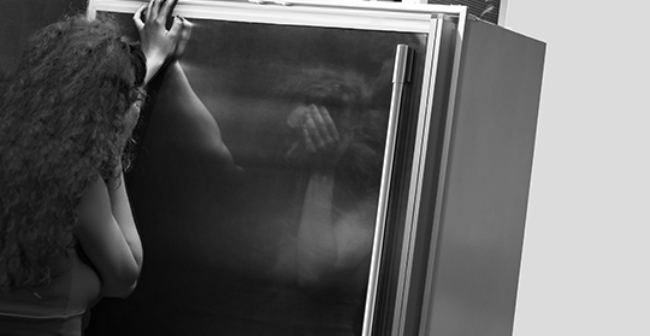Culture
 Photo: www.studiotheatre.org
Photo: www.studiotheatre.org
Queen of Basel’s Playwright Discusses Adaptation and Influences
March 29, 2019 @ 12:00am
Any time a contemporary artist decides to tackle and untangle a literary classic, the task is often monumental. However, when said artist then decides to mix and mold the already established characters into representations of the modern world, an adaptation is in the midst.
Critically acclaimed Hilary Bettis not only took hold of the characters and story from August Strindberg’s 1889 novel Miss Julie, but completely flipped it on itself. In an effort to provoke thoughts from diverse audiences, Bettis adapted the story from the troublesome Strindberg into the play Queen of Basel.
The play charges head first, focusing on societal aspects of power, race and class. Performances of the play are now in their last week at Studio Theatre, and before the Queen’s run ends, we spoke with the passionate Bettis about adapting the story, her process and the influences she draws from.
On Tap: How did you select Miami as the backdrop for this modern take on a classic play?
Hilary Bettis: Queen of Basel was originally commissioned by Michel Hausmann at Miami New Drama, with the goal of taking a familiar classic text and reimagining it specifically for a diverse Miami audience. So the backdrop was part of the assignment. Most of America likes to brush poverty under the rug – we don’t like to look at it. We live in gated communities or “gentrifying” neighborhoods, trying to separate ourselves as much as possible, but in Miami it’s so in your face. You literally have homeless encampments across the street from million-dollar condos. After spending time in the city, Miami felt like the perfect setting to explore a modern-day take on a play about wealth, class and power in 2019 America.
OT: What was most difficult when creating Queen of Basel?
HB: [August] Strindberg. Full stop. Aside from the original Miss Julie written as a total fever dream with messy internal logic and structure, which made trying to build a plot complicated, I fundamentally disagree with Strindberg’s view of humanity. He viewed women through the Madonna-whore lens. He believed “white” male sexuality is the epitome of strength. In his author’s preface Strindberg says, “Miss Julie is a modern character. Not that the man-hating half-woman has not existed in all ages but because now that she has been discovered, she has come out in the open to make herself heard.” And, “Jean is superior to Miss Julie because he is a man. Sexually, he is an aristocrat because of his masculine strength.” And, in his reference to Kristine (who he calls the “female slave”), “if my minor characters seem abstract, it is because ordinary people are abstract in their occupations.”
I believe ordinary people are unique, complicated and deserving of dignity. I believe sexuality female or male – doesn’t define the character or value of a human being. I believe men are capable of vulnerability and gentleness. I believe women are capable of strength and intellectual ideas. I believe people are equal in their flaws, their need for intimacy and love, their desire to be seen and valued. I believe choice comes out of circumstances. If we can understand the reality of a person’s life, we can find empathy – especially in the darkness.
OT: What will audiences discover or re-contemplate about race and power through Queen of Basel?
HB: The responses to the play have been utterly fascinating. People either love it or don’t know how to process it. The play really digs into the fluidity and messiness and ambiguity of privilege. All of these characters have power in some ways and are oppressed in other ways. They’re all victims and perpetrators. The play is designed to make an audience uncomfortable. My hope is that discomfort sparks conversation.
OT: Why the Latinx influence?
HB: I’m Latinx – my mother is Chicana – so everything I write tends to be through that lens. I was commissioned to write a bilingual adaptation for a Miami audience – so embracing Cuban, Venezuelan, Haitian [and] Colombian communities felt necessary. I also think America tends to think of Latinx as a monolithic culture; that couldn’t be further from the truth. Imperialism, slavery, Jewish people fleeing Hitler, genocide against natives, dictators, death squads funded by the U.S. and the empires built on that heritage – also plagues much of Latin America. I wanted an audience to see the nuance and diversity of communities within Latinidad.
OT: How did you and José Zayas get connected and how has it been working with him on this project?
HB: José is my theater soulmate. We’ve know of each other for a few years now, always wanting to work together, but the timing was never right. We finally got to work together at the Alley Theatre’s All New Festival last January on this play. We connected and got each other right away. He understands my voice and what I’m really after in my work and he challenges me to dig deeper, he never lets me settle. He’s really an actor’s director who knows how to make everyone feel empowered.
OT: What did you learn or discover during your creative process?
HB: So, so, so much, I was literally rewriting up until opening. This play is an actor’s play – three people in a room for 75 minutes bearing their souls and flaws and vulnerabilities – I really wanted the cast to have a point of view and a voice in our entire process. We had a lot of conversations about power, gender, race [and] how we navigate that onstage. How we portray these people with empathy, while remaining honest about their flaws.
But what’s fascinating is how Julie’s wealth sort of erases everything else about her. Audience’s are much more likely to forgive John and Christine than Julie, even though Julie is in just as much pain and turmoil.
OT: How has the current immigration conflict impacted your storytelling in Queen of Basel?HB: Immigration is something I write about in almost all of my work. The history of America is the history of immigration, and each generation has its immigrant story. Because I set out to write for a Miami audience, understanding the conflict in Venezuela, Castro’s Cuba and Baby Doc’s Haiti were vital to understanding the very fabric of Miami. Michel Hausmann, who commissioned this, is a Venezuelan ex-pat who fled the country after his theater was tear-gassed by [Hugo] Chavez. His family were Jewish refugees fleeing their homeland. The cycles of oppression, how we wield it in small and large ways, is the spine of this play.
OT: Aside from Strindberg, where else did you draw inspiration for this story?
HB: Certainly my own life. I’m mixed, white and Mexican, so I often struggle with where I fit in the world. All three characters are juggling multiple identities, so that part is very visceral and personal. And I’m a woman, so misogyny is personal. All of my collaborators have inspired me.
Queen of Basel is showing at the Studio Theatre through April 7. Tickets are $20-$97, and available here.
Studio Theatre: 1501 14th St. NW, DC; 202-332-3300; www.studiotheatre.org
This interview has been edited for length and clarity.







